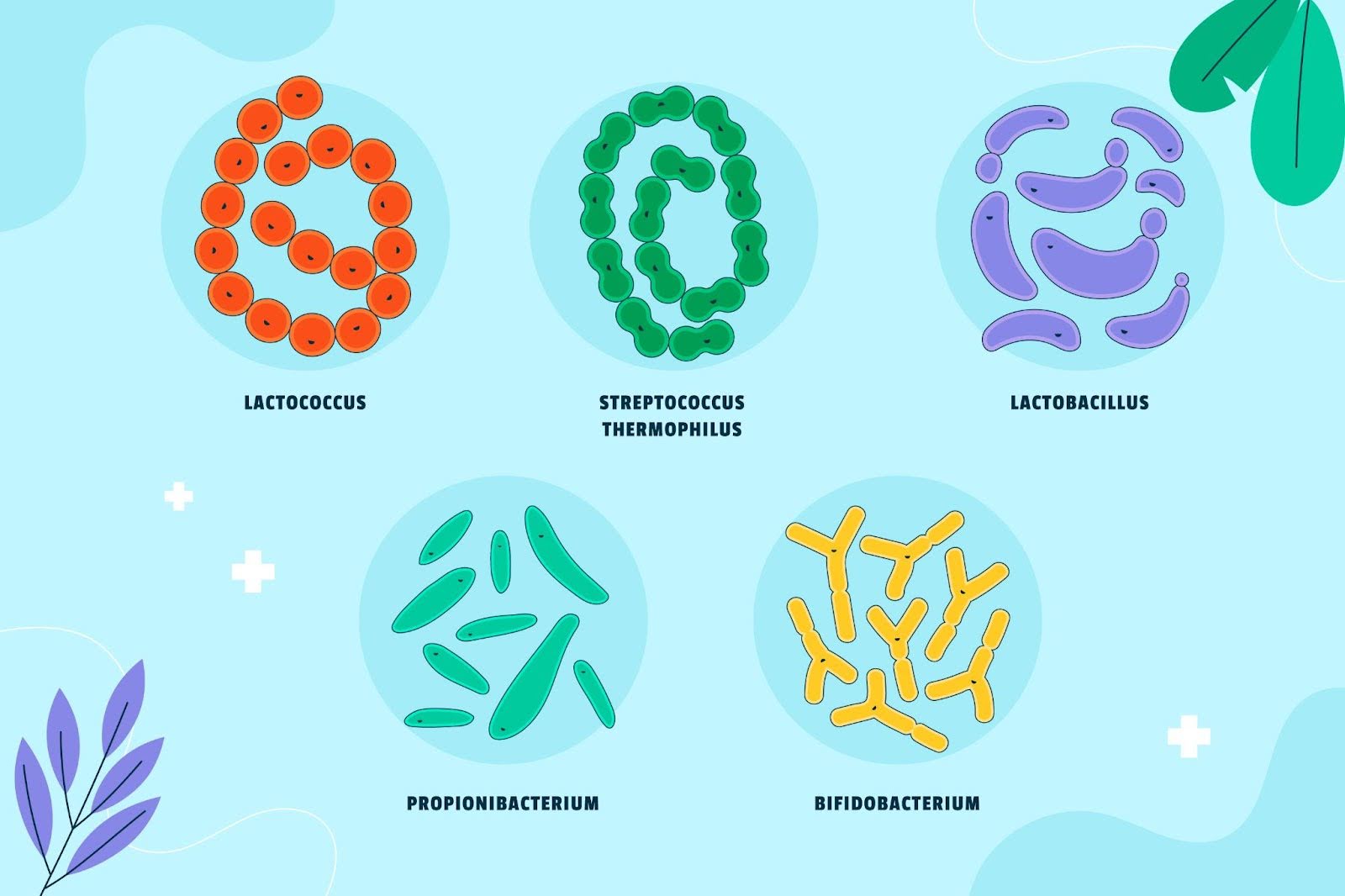In recent years, the conversation around gut health has surged, highlighting its larger role in our overall well-being. From digestion to immunity, the gut is often called our "second brain," influencing various aspects of our health.
However, with this growing interest comes a flood of information — some of it accurate, and some not so much. Gut health myths abound, making it a little challenging to discern fact from fiction.
Today, we're going to cut through the noise, clarify some common misconceptions, and empower you with the knowledge needed to make informed decisions about your digestive health!
Gut Health Myth 1: Probiotics Are a Cure-All for Gut Health

We couldn't discuss myths about gut health without probiotics! In recent years, probiotics have gained immense popularity, often being touted as a universal remedy for a wide array of gut-related issues.
This myth suggests that simply adding probiotics to your diet can resolve all digestive problems, from bloating to irritable bowel syndrome (IBS). Though the idea of a one-size-fits-all solution is tempting, the reality is more nuanced.
Validity: Partially True
The notion that probiotics are a cure-all is only partially accurate. There is, however, substantial evidence supporting the benefits of probiotics for certain conditions.
Research has demonstrated that probiotics can help restore the natural balance of gut bacteria, which is crucial for maintaining digestive health. For example, a study published in the Journal of Clinical Gastroenterology found that certain probiotic strains may alleviate symptoms of IBS, such as abdominal pain and bloating. Another study in the American Journal of Gastroenterology highlighted the role of probiotics in reducing the incidence of antibiotic-associated diarrhea.
Despite these promising findings, it's important to recognize the limitations of probiotics. Not all probiotics are created equal; their effects can vary significantly depending on the strain, dosage, and individual health conditions.
In other words, what works for one person may not work for another, as the gut microbiome is highly individualized. Additionally, some probiotic products on the market may not contain the strains or quantities they claim, leading to inconsistent results.
Gut Health Myth 2: You Need to Detox Your Gut Regularly

Regular detox cleanses are one of the biggest gut health myths. Proponents claim that these practices help eliminate toxins and reset the digestive system, promising improved health and vitality. However, the effectiveness of such detoxes is largely unfounded.
Validity: False
The belief that you need to detox your gut regularly is false. The human body is equipped with a highly efficient detoxification system that naturally eliminates waste as well as toxins.
The liver, for instance, is responsible for metabolizing toxins and converting them into harmless substances that can be excreted. The kidneys filter blood to remove waste products, while the intestines help in the elimination of waste through bowel movements. These processes occur continuously and effectively without the need for special diets or cleanses.
Because your body already has a filtering process, engaging in extreme detox diets poses significant risks to your health. Many detox programs involve severe calorie restriction, fasting, or the use of laxatives, which often lead to dehydration, nutrient deficiencies, and electrolyte imbalances. These practices can also disrupt the natural balance of gut bacteria, potentially causing more harm than good. In some cases, extreme detoxes might escalate into serious health complications, particularly for individuals with pre-existing medical conditions.
While the concept of detoxing may sound appealing, it's important to trust your body's natural detoxification processes! Instead of resorting to potentially harmful detox diets, focus on maintaining a balanced diet rich in fiber, staying hydrated, and leading a healthy lifestyle to support your gut health.
Gut Health Myth 3: Gluten-Free Diets Improve Gut Health for Everyone

Many have the notion that eliminating gluten — a protein found in wheat, barley, and rye — can benefit everyone, regardless of their health status. But the reality is that going gluten-free is not necessary for the majority of people and may even be counterproductive.
Validity: False for Most People
For individuals with celiac disease, consuming gluten triggers an immune response that damages the lining of the small intestine, leading to various health issues. Similarly, those with non-celiac gluten sensitivity may experience symptoms like bloating and abdominal pain when consuming gluten. For these individuals, a gluten-free diet is essential for managing their symptoms and maintaining gut health.
However, for people without these conditions, there is no scientific evidence to support the idea that a gluten-free diet offers any gut health benefits. Unnecessarily avoiding gluten may lead to nutritional deficiencies; a lot of gluten-free products are made with refined grains and lack the fiber and nutrients found in whole grains. The result is a diet that is lower in essential nutrients like iron, B vitamins, and fiber, potentially leading to digestive issues or other health concerns.
Gut Health Myth 4: All Fermented Foods Are Good for Your Gut

Fermented foods have become synonymous with the latest gut health trends. Often praised for their supposed benefits, the legend goes that all fermented foods are inherently good for your digestive system. While many fermented foods do offer some health benefits, it's important to understand that not all of them are equal in this regard.
Validity: Partially True
Like other gut health myths, the idea that all fermented foods are beneficial is only partially true. Certain fermented foods are indeed rich in live probiotics, which can support a healthy gut microbiome. These foods contain beneficial bacteria that aid digestion, enhance nutrient absorption, and boost immune function.
For instance, yogurt is a well-known source of probiotics (particularly strains like Lactobacillus and Bifidobacterium) which have been linked to improved digestion and reduced symptoms of lactose intolerance. Kefir, a fermented milk drink, is also rich in probiotics and has been associated with various health benefits, including anti-inflammatory properties.
The problem is that not all fermented foods contain live probiotics. Some products undergo pasteurization or other processing methods that kill beneficial bacteria, rendering them less effective for gut health.
Certain fermented foods are also high in sugar or salt, which may negate their potential benefits. Commercially available products like pickles and sauerkraut are pasteurized and contain added sugars or excessive salt, which can be detrimental to overall health if consumed in large quantities.
Gut Health Myth 5: Stress Doesn't Affect Gut Health

The belief that stress has no impact on gut health is a very common misconception. Many people assume that stress is purely a mental or emotional issue, with no direct consequences for the digestive system. As far as gut health myths go, we're here to confirm this couldn't be further from the truth!
Validity: False
There is a strong link between the brain and the gut, known as the gut-brain axis. This connection allows the brain and gut to communicate with each other through nerves, hormones, and the immune system.
When you're agitated, your body releases stress hormones (i.e. cortisol). Stress hormones can slow down or speed up digestion, make the gut lining more sensitive, and change the balance of bacteria in your gut. These changes might cause symptoms like bloating or discomfort, making conditions such as IBS worse.
Stress Management Tips for Gut Health
Looking to feel less anxious in your day-to-day? Before we move on to other gut health myths, here are a few stress reduction strategies to keep in mind:
- Mindfulness and Meditation: Practicing meditation helps calm the mind and reduce stress levels. Even a few minutes a day can make a big difference!
- Regular Exercise: Physical activity is a powerful stress reliever. It promotes the release of endorphins (natural mood lifters) and improves gut motility.
- Balanced Diet: Eating a diet rich in fiber, fruits, and vegetables supports gut health and helps mitigate the effects of stress on the digestive system.
- Adequate Sleep: Ensuring you get enough restful sleep is essential for stress management in addition to overall health. Aim for 7-9 hours per night.
- Deep Breathing Exercises: Simple deep breathing exercises can activate the parasympathetic nervous system, which helps your body recover by slowing your heart rate, boosting digestion, and saving energy.
Gut Health Myth 6: Fiber Supplements Are as Good as Fiber from Food

Many people turn to supplements for convenience, thinking they offer the same benefits as fiber-rich foods. The truth? While fiber supplements can be beneficial, they are still not a complete substitute for that which is found in whole foods.
Validity: Partially True
Fiber supplements can be helpful for individuals who struggle to get enough fiber from their diet due to specific dietary restrictions or health conditions. They aid in improving bowel regularity and alleviating constipation, providing a convenient option for those who need a fiber boost.
Psyllium husk, a common fiber supplement, has been shown to help regulate bowel movements and improve symptoms of IBS. For individuals with specific needs (like those with limited access to fresh produce), supplements offer a practical solution to increase fiber intake.
Conversely, relying solely on fiber supplements means missing out on additional nutrients and benefits that come from whole foods. Foods rich in fiber — fruits, vegetables, whole grains, and legumes — provide a wide range of vitamins, minerals, or antioxidants that supplements simply cannot replicate.
These nutrients work together to support overall health, including heart health, weight management, and a healthy gut microbiome. What's more, the fiber in whole foods often comes with additional water content and other compounds that aid in nutrient absorption.
Grow Your Gut Health With Arnot
Don't let gut health myths hold you back! At Arnot Health, we provide comprehensive care for digestive wellness.
Let us partner with you on your path to a healthier gut — book a consultation with one of our nutrition or gastroenterology specialists today!

